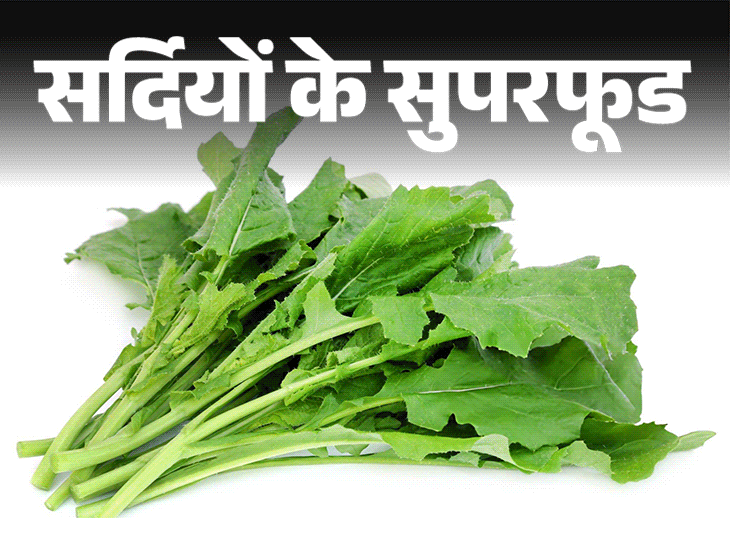‘winter Today’s food in the “Superfoods” series is: “Mustard Fenugreek Greens.”
With the increasing cold, the green color is gaining popularity in the decoration of vegetable markets. Different types of vegetables are available in the market. In this, people have different passion for mustard and fenugreek leaves. So understand that in winter, many restaurants and dhabas in North India operate solely on mustard leaves and fenugreek.
These green vegetables taste great and are packed with essential nutrients for the body. It also contains many essential vitamins and minerals. Its particularity is that it is a low-calorie food and also provides all the essential micronutrients to the body.
Our grandmothers have been preparing mustard and fenugreek leaves for years. This is the reason why people did not need glasses to thread a needle, even until the age of 60-70.
Today, the desire for instant food is pushing vegetables away from the plate. It is now part of the special menu in restaurants. It is therefore important to know that just 100 grams of fenugreek leaves provide 186% of the daily iron requirement. Just one cup of mustard greens provides 120% vitamin K.
That’s why today in the “Winter Superfoods” series we will talk about mustard and fenugreek leaves. You will also learn that-
What is its nutritional value? What diseases can mustard and fenugreek leaves prevent?
Expensive fruits can’t compete with green vegetables.
Nutritionist Dr Anu Aggarwal says that if someone eats green vegetables every day in winter, it can be more beneficial than eating lots of expensive fruits. This is because green vegetables are low in calories and high in nutrients.
Mustard and fenugreek leaves contain little or no sugar and fat. It also contains fewer carbohydrates, while fiber is in sufficient quantity. See its nutritional value in the graph:
Mustard and fenugreek are a treasure trove of minerals.
Mustard contains most of the vitamins necessary for the body. These two green vegetables are a treasure trove of essential minerals like iron, potassium and magnesium. See the graph:
Eating mustard and fenugreek leaves will prevent many diseases
Nature provides fruits and vegetables according to the body’s needs in each season. Greens are like a boon for us in winter. Dr. Anu Aggarwal says that if one consumes mustard and fenugreek leaves two to three times a week in winter, the risk of many diseases can be reduced.
Eating green vegetables relieves arthritis pain and reduces the risk of coronary heart disease. The skin is healthy and radiant. It also improves brain functioning. See the graph:
Some Common Questions and Their Answers Related to Mustard and Fenugreek Leaves
Question: How many mustard and fenugreek leaves can we eat per day?
Answer: Dr. Anu Aggarwal says that it is generally safe to eat one or two servings of mustard and fenugreek leaves per day. Eating too many green vegetables can cause diarrhea, intestinal swelling, and even abdominal pain. Eating too many green vegetables continuously for several days can also lead to kidney stones.
Question: Are there any side effects of eating mustard greens?
Answer: In general, mustard greens are considered safe for everyone. However, in some cases its side effects can also be observed:
Due to the high amount of phosphorus and fiber, the absorption of iron, calcium and magnesium may be reduced. Due to the high amount of vitamin K, the blood can become thin. If you have a bleeding disorder, the symptoms can be serious. Eating mustard greens can cause gas and bloating.
Question: What are the side effects of consuming fenugreek leaves?
Answer: Eating fenugreek leaves can cause allergic reactions in some people.
Diarrhea, vomiting or bloating may occur. Blood sugar levels may be low. If a person has asthma, their symptoms can be severe. After eating this product, some people may experience headaches or dizziness.
Question: Can eating mustard greens cause kidney stones?
Answer: Yes, that’s true. Due to the high amount of oxalate it contains, there may be a risk of kidney stones. People who have kidney stones or have had such a problem in the past should consult a doctor once before eating mustard greens.
Question: Who should not eat mustard and fenugreek leaves?
Answer: Check out the tips below to know which people should not eat mustard and fenugreek leaves:
These people shouldn’t eat mustard greens
People with bleeding disorders. Those who have kidney stones or who have ever had problems with stones. Those who often have gas or bloating problems.
These people should not eat fenugreek leaves:
Small children, especially those who are allergic to peanut butter. Those who suffer from kidney or liver disease should consult their doctor before consuming it. If you are taking any medication or supplement, definitely consult your doctor.
…………………… from the winter superfoods series 1. Winter superfood – Millet is a treasure of zinc and magnesium: Gluten-free, easy to digest, controls sugar
Eating marketa keeps blood sugar levels under control, bones become strong and cholesterol levels decrease. Eating it also reduces the risk of asthma and cancer. …
2. Winter Superfood – A piece of jaggery a day will save you from anemia: make periods regular, beneficial during pregnancy.
Eating jaggery increases the energy level. Besides many essential vitamins, it also contains important minerals like iron, magnesium and calcium. It prevents the risk of anemia and is extremely beneficial against joint pain. …

